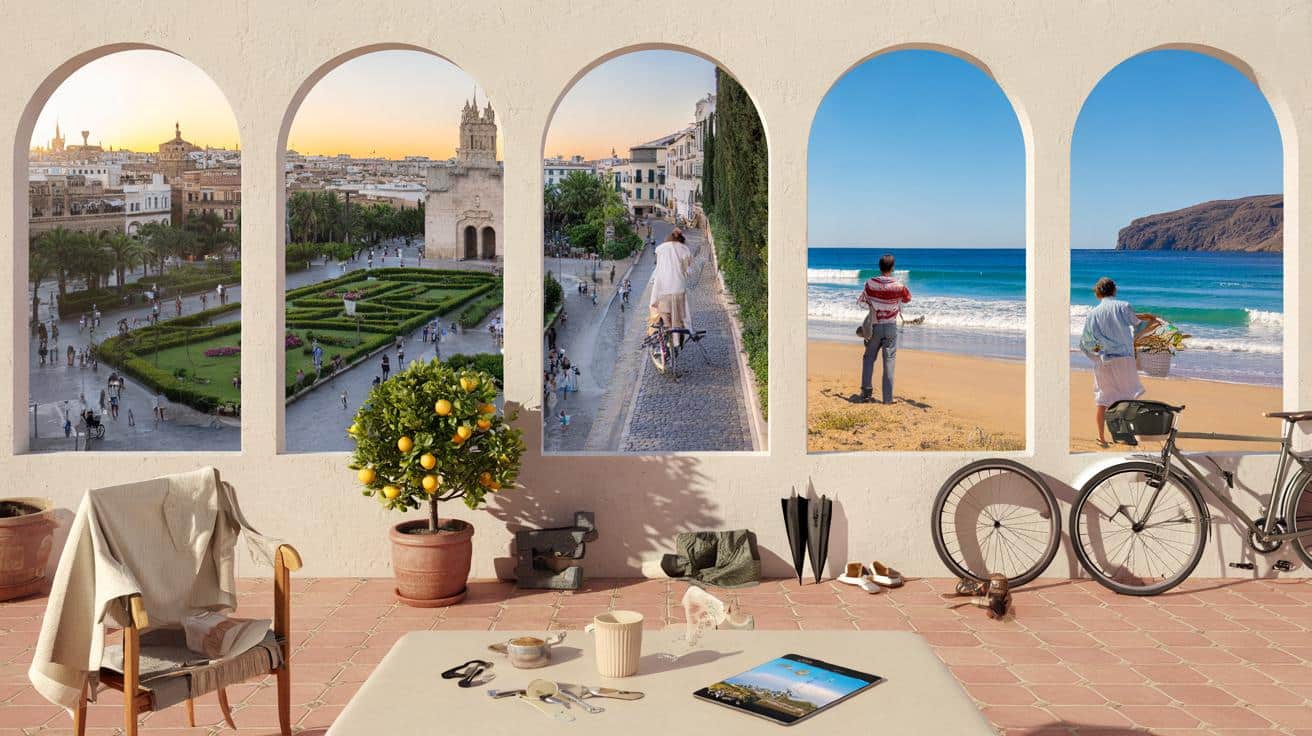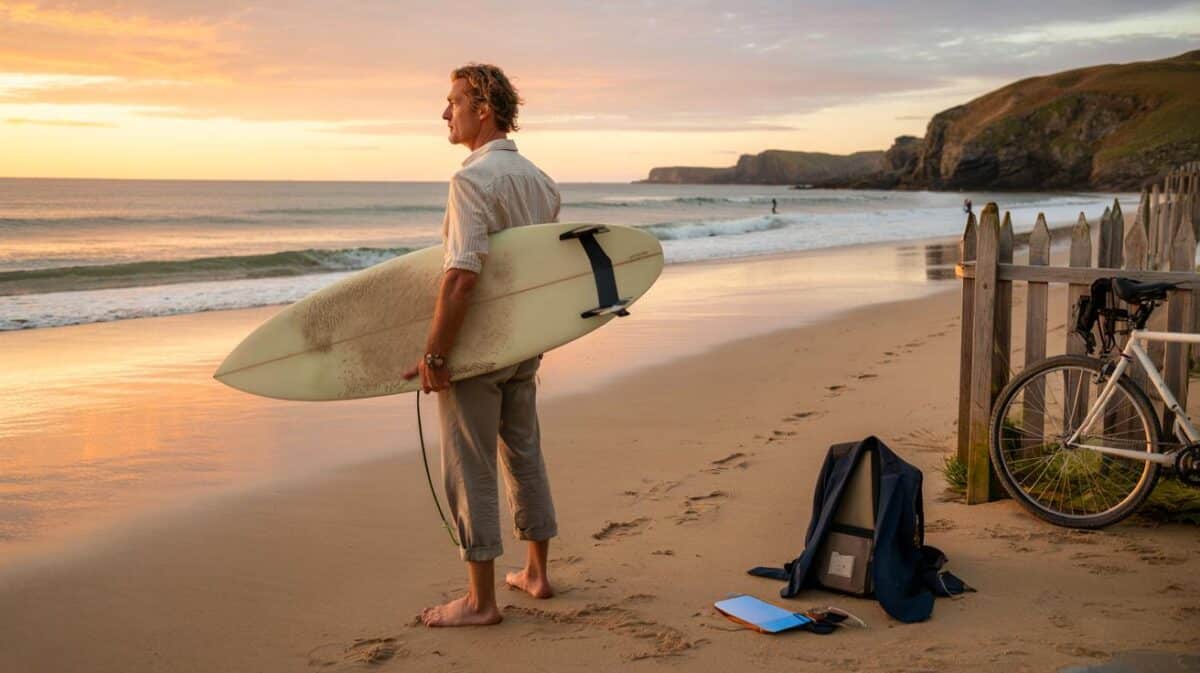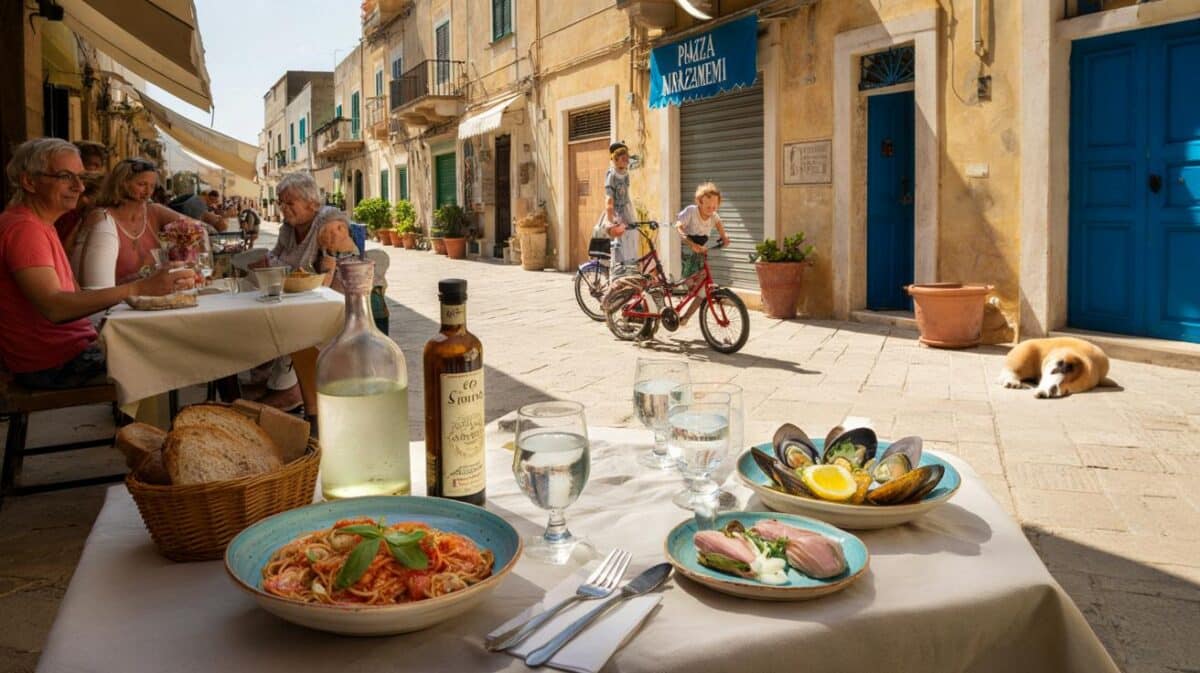If you’re tired of paying London rent to stare at grey skies and spend a quarter of your day wedged into a carriage, you’re not alone. More people are swapping drizzle, direct debits and delayed trains for sunlight, sane prices and a commute that looks like a stroll to the bakery. The fantasy isn’t just a postcard. It’s an address.
” The photo showed a tiled balcony, lemon trees, morning that looked like morning. A van hissed past, the spray catching my ankles. A bloke next to me muttered that his rent had jumped again, and we both laughed like it was normal. The bus arrived, late and full. I didn’t get on. I opened a map and pinned a beach I’d never heard of. Maybe the map is wrong.
Where the sky clears and the bills shrink
Walk through the old town of Valencia at 8am and you hear shutters, cups, bikes. People glide to work in linen and trainers, not armour and umbrellas. Rents undercut Madrid and Barcelona, and way undercut London; a bright one-bed can still sit around £700–£900 if you look beyond the cathedral spires. The city is flat, stitched with bike lanes, with a park in a former riverbed that everyone actually uses. Sunlight drapes the Turia gardens, and the commute becomes a ritual you don’t resent.
On a side street near Las Canteras beach in Las Palmas de Gran Canaria, I met Carla, a graphic designer who lives above a surf school. She starts at nine, finishes at five-thirty, and her “rush hour” is waiting for the green man beside a palm. The climate sits around 22°C most of the year, with a breeze that keeps laptops calm. Co-working spaces spill onto pavements, and fibre internet hums. She pays roughly £650 for a high-ceiling studio you’d put on a postcard. She spends more on sun cream than on train fares. That’s the point.
Strip away the slogans and you see a simple equation: weather you can trust + rent that doesn’t bite + distances that invite walking. It’s why Medellín pulls so many people into its orbit. The “eternal spring” tag isn’t fluff; days sit in the low twenties, evenings are soft, and you can eat outdoors without checking an app. Laureles has pavements and trees, and the metro glides rather than snarls. A solid one-bed might be £400–£700 depending on your block. The city rewards routine, not punishment. That’s what “quality of life” feels like in the bones.
How to choose and move without losing your mind
Use a 30–30–30 method. Spend 30 minutes checking long-term rental listings, 30 minutes on climate data for each month, 30 minutes on commute options inside your target neighbourhood. Then do a 30-day trial if you can. Track three numbers: rent-to-income ratio, average daylight you’ll actually be awake for, door-to-desk time. A simple budget works: rent at 30–35% of take-home, utilities and phone at 8–10%, groceries at 12–15%, fun at 10%, buffer at 10%. If a place breaks the math or your mood, it’s not a match.
Common traps are romantic and fixable. People fall for a sea view and forget about August crowds, or sack off visas until the day at the airport. Start small: one suitcase, one month, one neighbourhood. We’ve all had that moment when the fantasy collides with the washing machine you can’t work and the SIM that won’t connect. Speak to three locals, not just expats, and ask where they’d live on your budget. Let’s be honest: nobody really reads the tenancy contract line by line every day. Read it once. Take photos. Keep copies. Then go outside.
Someone said a move is just changing your view out of the window; the truth is it changes what you do with your day.
“I swapped Clapham for Lagos and the loudest thing I hear at 6pm is cutlery on plates. My rent halved. My shoulders dropped. I stopped scrolling Rightmove like it was a hobby.”
- Lagos, Algarve, Portugal: golden beaches, boardwalk runs, and around 300 sunny days. One-beds from roughly £600–£900 off-season; a town centre you can cross in ten minutes on foot.
- Canggu, Bali, Indonesia: café culture meets scooter life. Monthly villas from £400–£800 if you’re flexible, co-working by the rice fields, sunsets that end arguments.
- Valencia, Spain: bike everything, paella on Sundays, flats that don’t demand your soul. Easy city for Spanish lessons and real neighbours.
- Las Palmas de Gran Canaria, Spain: “eternal spring,” surf before stand-up, European healthcare, no-jacket season for months.
Picture the day you stop checking the forecast
The first week in a new city is loud. Keys clatter, doors stick, your mouth searches for the right word at the bakery. Then it softens. A woman at the fruit stall knows your face. You learn which street keeps shade at four. You time your swim to the tide, not to platform five. *The small good moments start turning up on time.* In this life, the hours stretch, and money behaves. You stop hoarding weekends like rare coins. Share your short-list with a friend. Post a photo to your future self. Keep the pin in the map until it looks less like a risk and more like a return.
| Point clé | Détail | Intérêt pour le lecteur |
|---|---|---|
| Sun you can plan around | Valencia, Algarve and Canaries offer ~300 bright days and mild winters | Fewer ruined plans, better daily rhythm |
| Lower rent, real space | Quality one-beds from ~£600–£900 in many districts outside tourist cores | Keep savings, upgrade lifestyle without the squeeze |
| Commute becomes a walk | Compact centres, bike lanes, beachside paths replace crush-hour | More time, less stress, healthier habits |
FAQ :
- How much should I budget to test a move for one month?Plan for first month’s rent + deposit, £300–£500 for setup (SIM, transport, basics), and a 20% buffer. In many sunny cities, £1,500–£2,200 covers a lean trial.
- Do I need a visa to work remotely?It depends on your passport and where you earn. Many places have digital nomad or long-stay options; check official sites and consider paying a local lawyer for one clear hour.
- Is the internet good enough for video calls?In Valencia, Las Palmas, Medellín and Canggu, fibre or strong 4G/5G is common in urban areas. Co-working spaces publish speeds and usually offer day passes.
- What about safety when choosing a neighbourhood?Look at recent, local forums and maps, then walk the area at different times of day. Speak to shopkeepers. If your body feels tense on the street, listen to it and move your pin.
- Will I cope without speaking the language?You’ll survive with English in hubs, but your life multiplies when you learn basics. Start with greetings, numbers and food. A weekly class turns strangers into acquaintances.









